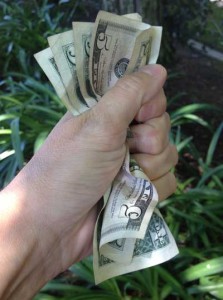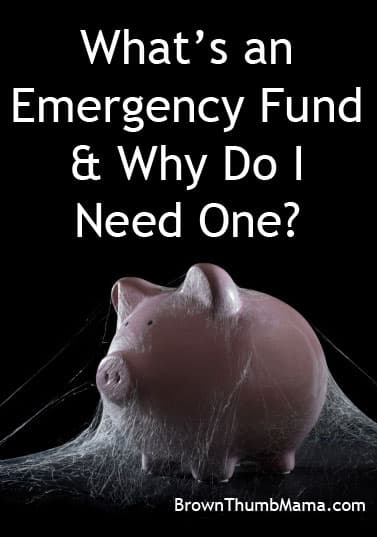Two years ago a dear friend’s husband was unexpectedly laid off from his sales job. She came to me in a panic (knowing my frugal reputation), and we started strategizing about what to do. One of the first things I asked her is, “Do you have an emergency fund?”

What is an emergency fund?
An emergency fund is “fallback” money that is set aside specifically for unexpected expenses–things like a job loss, broken refrigerator, and so on.
The concept of the emergency fund has been around for a long time. My grandma used to keep a jar of money under one of the loose floorboards in her bedroom closet!
Today, the idea of an emergency fund has been popularized by financial experts such as Dave Ramsey. I picked up his book The Total Money Makeover from the library and it was very helpful in getting us started.
Who needs an emergency fund?
Everybody! (See story above.) Emergency funds are critical for those paid only on commission, or for one-income families. If something happens to the sole earner, you must have something to fall back on.
How much do I need in my emergency fund?
This is pretty easy to figure out. Sit down and calculate how much money you need to live on for 3 to 6 months. No extremes, either–I’m not talking about living solely on beans and rice, nor am I talking about going out to dinner every other day.
How much do you need to pay your bills, eat at home, and still enjoy the occasional treat? Most families will need to save at least $10,000.
Why do I need thousands of dollars in my emergency fund?
Yes, $10k sounds like a lot–but here’s why it’s important.
You just don’t know what kind of curve balls life is going to throw at you. Like my friend, you or your spouse could face a sudden job loss. Like my cousin, your kid could break a leg while skateboarding and need surgery. Someone could run a red light and total your car.
“But I have a credit card!” you exclaim. “Why do I have to take money out of my daily budget when I could just charge it?”
Yes, you could. But for most of us, debt is a slippery slope. An emergency will happen, and you’ll charge it. It will take months or years to pay off, and interest charges will build up. Since you already have a balance on the card you think, “What’s just one more thing?” Before you know it, you have charged thousands of dollars and paid hundreds (or more) in interest.
How do I get started building an emergency fund?
The first step is to pay off your credit cards. Why is this? Because you’re losing more than you’re gaining by having a credit card balance.
Consider the following: the interest on your credit cards is probably from 5%-25%. Even the high-yield savings accounts are paying less than 1% these days. Therefore, you need to pay off the credit cards (and stop using them) before you start saving.
After paying off your cards, take a look at your budget. See if there are areas where you can cut back–again, without going to extremes. If you take all of the fun categories out of your budget, you won’t stick with it.
Here are a few ways to cut back on your budget.
- 50 Ways to Save More by Using Less
- Start an herb garden or vegetable garden
- Make your own natural cleaning products
- 20 Things I do to Save Money
Where do I put my emergency fund money?
The ideal spot for your emergency fund is a bank or credit union that’s accessible, but not too accessible.
Our emergency fund is in the local credit union, and I don’t have an ATM card or checkbook for the account. This means that I can only access the money in person, by going to the teller. This “inconvenience” stops me from using the money frivolously, because it’s a pain in the butt to get the money out.
How do I get the money for my emergency fund?
Direct deposit from your paycheck is the easiest way to save for your emergency fund. If you don’t “see” it in your primary bank account, it will just quietly build up and earn interest.
If you think don’t have any extra money in your paycheck–stop! Let’s take another look at your budget and find ways to squeeze it for extra money.
If that doesn’t work, it’s time to pick up a side job. As many of you know, my essential oil business started out as a side job, and it now supports our family!
Side jobs can be as simple as mowing the neighbor’s yard or as formal as getting a second job. You can find tons of ideas about side jobs on my Pinterest board, “Save Money/Make Money.”
When do I use my emergency fund?
Contrary to what many people think, a sale at the mall is not a reason to use your emergency fund. (I know you don’t think that way, but just in case…)
There are three questions you have to ask yourself before dipping into your emergency fund:
- Is this a surprise expense? Christmas, for example, is not a surprise. Neither is back-to-school shopping or your annual homeowner’s insurance payment.
- Is it absolutely necessary? Repairing a water leak in the kitchen is absolutely necessary. Buying a new kitchen faucet because it’s on sale is not.
- Is it urgent? A broken leg is urgent. A new washing machine to replace your old (but still functioning) machine is not.



